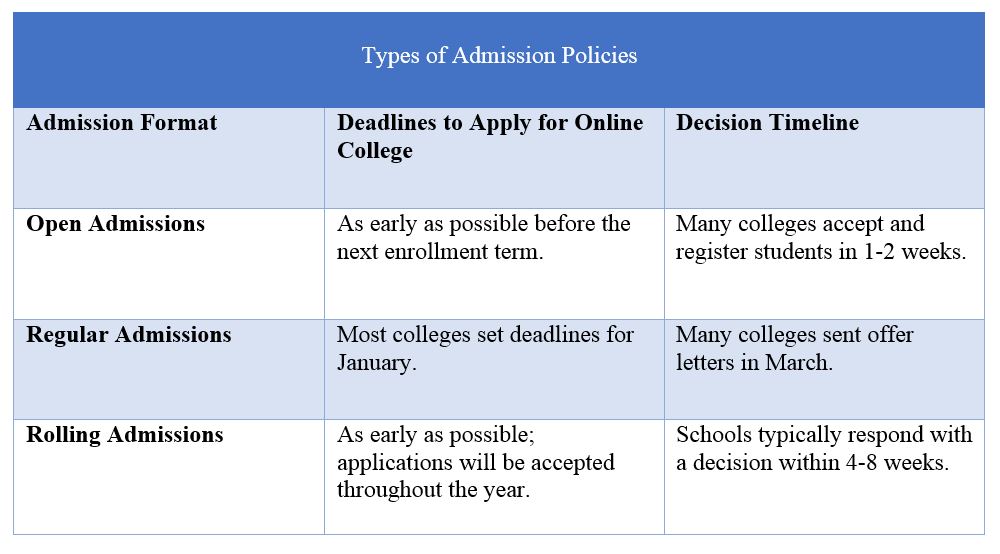The advent of online education has revolutionized the learning experience. Students have the option of completing their entire degree online, starting with the application process. Many universities have improved their online application processes to make them more efficient and user-friendly. Accredited colleges and universities have similar admission requirements for online and formal undergraduate programs. Students must have the following documents in hand when applying to an online college.
- Official transcripts.
- Personal Statements.
- Letters of recommendations.
- Certificates or summary of extracurricular activities.
- An application fee.
It is essential to know that some bachelor’s degree programs often have additional requirements, so be sure to check your college’s website to avoid inconveniences at the time of the enrollment process. Many students wonder; “what documents do I need to apply to an online college?” read on to learn more about it.
Document requirements for online college
Applicants must submit the following application materials to secure admission to an online college. All application processes, including document submission and confirmation, can be completed electronically.
Official transcripts and degrees
School admissions officers commonly request official transcripts and degrees from online applicants. Official diplomas are original, watermarked documents, and mailed directly in a sealed, stamped, envelope from one college to another.
Note: Some colleges may require a verified copy of original transcripts, so check with your college before enrolling in any online degree program.
Students can request diplomas and transcripts from their school registrar’s office by filling out an online form and paying an administration fee.
Test scores
Another common requirement for online college applicants is the completion of standardized tests. Undergraduate applicants are often required to submit ACT or SAT scores, whereas graduate programs may require GRE or GMAT scores. Individual schools and universities decide whether or not to follow strict policy guidelines for minimum standardized test scores.
Some colleges waive this requirement for pupils who have extensive work experience or have a GPA that exceeds a certain threshold. Others may accept AP or prerequisite scores in place of standardized test scores. Students who have not taken their state exams may apply to schools with a “test-flexible” or “test-optional” admissions policy. Please, note that a growing number of colleges are now moving away from standardized tests requirements.
English proficiency tests such as IELTS and TOEFL may also be required to evaluate the language abilities of international applicants.
Personal statement or statement of purpose
Many online colleges require personal statements to analyze students’ writing skills and aspirations for a college degree program. Keep in mind that not all online degree programs have this application requirement.
Aspiring candidates might be asked to answer a writing prompt similar to that of a college-level assignment. Graduate applications typically request broader statements that delve into a student’s career or independent study objectives. Successful college essays may include the following topics:
- Influential factors in your life or career choice.
- A problem you want to solve.
- A proud moment in your life or a time when you achieved your goals.
- A cause to which you are deeply committed.
- A time when you overcame adversity or excelled in an academic or personal endeavor.
Extracurricular activities certificates
While extracurricular activities can be a plus point for your college application, some universities may not value them as highly as others. Colleges may also use extracurricular certificates to try and better understand how online trainees connect with their community and peers.
Remember that it is best to pursue high-quality extracurricular activities that you are passionate about, rather than focusing on quantity. High school students and young adults can participate in the following extracurricular activities:
- Sports and athletic competitions.
- Part-time employment.
- Leadership positions.
- Academic study clubs.
- Artistic pursuits.
- Internships.
- Volunteering.
List of academic honors and achievements
Many schools award the role of honors and other certifications to students who have excelled during their college careers. If you have these types of credentials, make sure you highlight them on your online college application. Some examples of appropriate honors include membership in the National Merit Scholars, Advanced Placement (AP) Scholars, and the National Honor Society.
Many first-year students choose to include their honor roll or class rank status in their application. Students may also be asked to fill out a questionnaire or write a resume to outline their academic and professional accomplishments. This is the most common requirement for graduate-level studies or programs geared toward older students.
Letter of recommendation (LOR)
Many college administrators may request letters of recommendation to gain insights into an applicant’s character and potential. Some online schools do not require recommendation letters. However, if they do, recommendation letters from a student’s teachers, mentors, or counselors can help enhance students’ application by emphasizing their strengths and achievements.
Students can also seek advice from a trusted employer, mentor, or religious charge. It is best to give letter-writers several weeks to complete your request.
How can I apply to an online college?
An online college’s application process is typically handled via an online portal. While some online colleges use centralized application systems, such as the Common App, others require applicants to submit individual enrollment applications to their specific college.
According to expert opinion, students should apply to 4-12 schools at a time. It’s crucial because it allows you to use all of your options without feeling overwhelmed or distracted.
Application timeline
Applying to universities requires careful planning. High-school students who want to enroll in online degree programs can begin the registration process by the end of their senior year. They should apply for online courses by the middle-to-late of their junior year; if they intend to apply for early admission.

Students interested in a program or school that has open admissions or a regular admissions policy can apply throughout the year. Nevertheless, returning students may be required to apply for an online degree program during the school’s open enrollment period.
Application fee
Although individual costs vary, most online colleges charge an application processing fee of $35-$55. This application fee may vary depending on several factors, including the college’s ranking and degree of competition. For example, some Ivy League colleges may charge about $100 to apply. Grants or scholarships do not typically cover application fees, but students with poor financial status may become eligible for fee waivers.
Applying to Online Colleges: Dos and Don’ts
Do’s:
- Start gathering documents early.
- Get feedback on your statement from someone you trust.
- Check your deadlines three times and keep a steady pace.
- Search for application fee waivers; if they are available.
- Give sources one month to write recommendation letters.
Don’ts:
- Remember to proofread your essay.
- Don’t rush the people who will be writing your letters of recommendation.
- Do not wait until the last minute to submit your application.
- Don’t use the same personal statement for multiple applications.
- Do not take the ACT or SAT right before your application deadlines.
Frequently Asked Questions (FAQ) About Online College Admissions
How much does it cost to apply to an online college?
While prices vary depending on the college and program, most online schools charge a registration fee of roughly $55. Online community colleges and technical schools typically charge lesser tuition fees than high-profile institutes. Additional fees may apply for services such as requesting and posting official diplomas and taking the ACT or SAT.
How long does it take to apply to an online college?
Students can save money and time by submitting their applications through a centralized platform such as; Common App. Online schools do not always offer a centralized application platform. Please, note that these schools will only give you 30 minutes to write your statements, and gather all necessary application materials.
Is online college worth it?
Online college can provide many benefits over traditional programs. Students who enlist in an online degree program often choose to study part-time or full-time, attend hybrid or 100% online classes and view the pre-recorded course material or content.
Pupils can study from any location depending on the availability of the internet. They may also be able to achieve a work-life balance while pursuing an online degree. Apart from exceptional flexibility, many online universities also offer greater accessibility. For example, out-of-state students who take their courses online may be eligible for in-state tuition rates.

